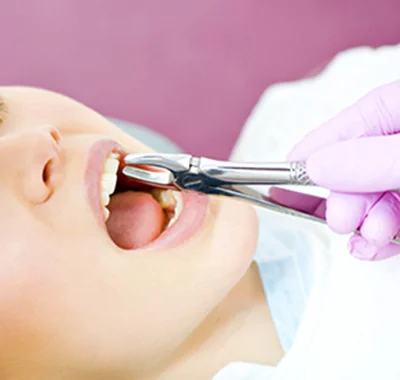Our approach to teeth extraction
At Dovan Dental, a tooth extraction is always a last resort. Natural teeth almost always function better than artificial teeth such as dentures, bridges or implants. However, if the tooth cannot be saved or treated by other means then extraction may be the best alternative in some situations. Our aim is to achieve the best outcome over the long term, while giving you the most satisfactory function and appearance possible.
Some common reasons for extraction are:
If there is extensive damage to a tooth through decay or trauma;
If there is severe periodontal disease and infection;
If it may lead to serious complications such as abscesses in the teeth or roots, or the spread of infection;
To improve appearance as other teeth may interfere and to correct a bite through braces and;
There is no function to the tooth; eg. no opposing tooth to grind against during chewing).
Removal of teeth in children:
Children’s primary (deciduous) teeth, sometimes called baby teeth or milk teeth, are rarely extracted as they are important for proper eruption of secondary (permanent) teeth. See some of the common reasons for extraction above.
What's involved in a tooth extraction:
After examination involving a full medical history and oral examination, we may require an xray of the tooth to plan how to best and safely remove the tooth. We will ensure that the area is properly anesthetized so the removal is painless. The method of extraction will vary depending on the type of tooth and its roots, and its position in the jaw but we will ensure that you are fully informed of all risks and the manner of the removal before any treatment is done. Depending on the number of teeth be removed, it may last one session or require multiple sessions.
After extraction:
To prevent neighbouring teeth from moving into the gap, a bridge, plate or dental implant may be necessary.
We recommend that after extraction you should:
Rest at home.
Depending on the number of teeth removed, you may need to take time off work, school or other duties.
Avoid drinks containing alcohol while you are taking pain killers or antibiotics.
Eat soft foods such as soups, blended (pureed) vegetables and meat and jellies for the first two days.
Drink a lot of fluids.
Use ice packs to reduce any swelling and pain.
Too difficult to remove
In limited circumstances a tooth may be very difficult to remove.
Difficult extractions are usually due to:
Adjacent teeth having crown or large restorations (fillings).
The tooth being in an abnormal position and affecting neighbouring teeth.
A nerve lying near the tooth to be extracted.
Roots that are large and curved, or that penetrate deeply into the jaw bone.
An unerupted or impacted tooth or a tooth that is fused to the jaw bone (ankylosis).
In difficult cases involving molars or premolars, the tooth may have to be divided into segments so it can be removed easily and safely.
For very complex wisdom teeth extractions that are beyond our abilities (we'll know it once we see it and take an xray), we know excellent specialist practitioners that we can refer you to.
Pricing
As each case varies significantly from person to person, we recommend a more accurate quote after a checkup from us.
Contact us
Contact us for more information or to book an appointment for a tooth extraction.


